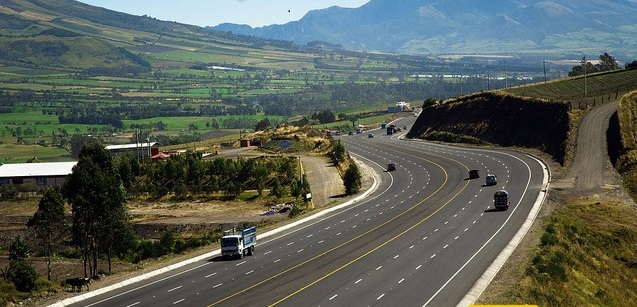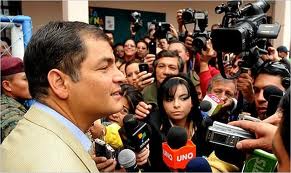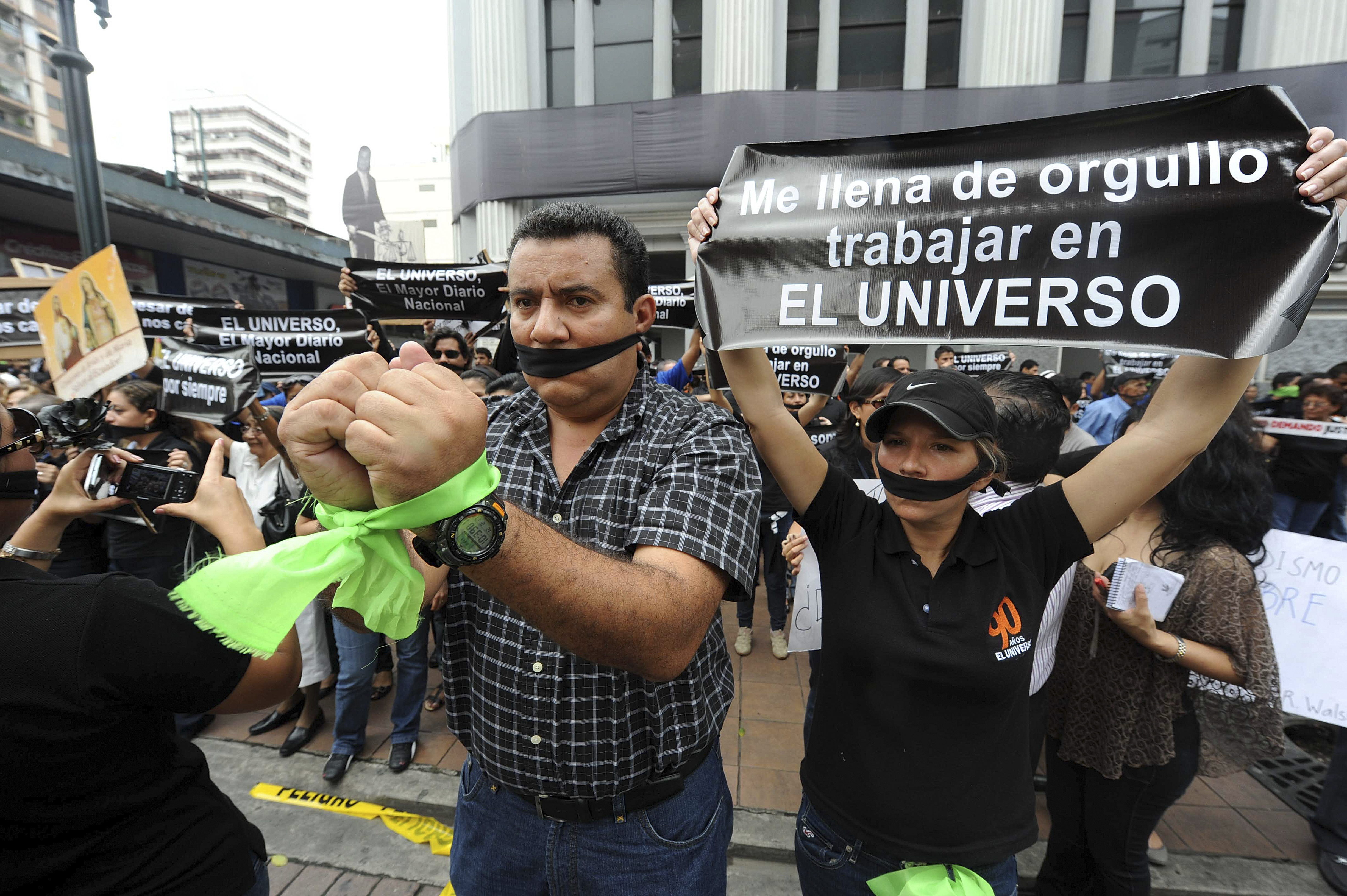In Ecuador, Political Realities Widen Marginalization Traditions as Country Feels Boom
* The Andean country is experiencing an economic boom, exemplified by a bonanza in public works, such as the construction of modern highways and updated hospitals—unthinkable in an earlier epoch.
* From a long line of failures, a push back against past traditions of executive arrogance has yielded the current President Rafael Correa: intelligent, cunning, hardworking, and a populist—not to mention politically experienced against any adversary who dares to challenge him in or out of negotiations.
* China has become Ecuador’s new vital economic partner for the country’s diversification. Ecuador is rapidly becoming more dependent on the Asian giant to cover its budgetary shortfalls. This is only one indication of the growing importance of the relationship between Beijing and Quito, which Ecuador is balancing in its assertion of its sovereignty.

It is tempting to imagine—in light of the headlines of Ecuadorian daily newspapers widely followed in the United States—that perhaps Ecuador, in the last five years, has become a land of hope. The Correa government has assured its popularity by taking the risky step of airing its grievance against outside intervention. Presently, Ecuador might seem to be in a different situation where its future destiny is still yet to be decided.
On the surface, the country has constructed modern roads and updated other infrastructure as part of an annual public works program involving $1 billion USD annually. This program includes reforms and investment in education and newly equipped hospitals erected as part of President Correa’s administration’s efforts for sweeping reform. According to current presidential candidate Alberto Acosta, former minister of the department of Energy and Mines and challenger of Correa in the next presidential election, public investment in education rose from 2.59 to 5.59 percent of GDP between 2006 and 2011. Health expenditure has also increased from 1.24 to 2.17 percent of GDP during that time. Acosta highlights that “Correa’s government emphasizes its social engagement. Comparing the social investment with the GDP, the improvement is undeniable.” [1]
Equally surprising is that these advancements came after a period of undeniable political instability in the convulsive decade between 1996 and 2006, which experienced a total of seven presidents. Still today, there is no guarantee that Ecuadorian democracy will finally be protected from social convulsions and disruptive disturbances as a result of future developments in Correa’s vision for his political career. Ecuador has not been risk-free of coup d’etat attempts in what still remains a fragile democracy. For example, on September 30, 2010, the country experienced an attempted coup in which the police resorted to firepower over the Ley del Sector Público (the law of the public sector), which the day before had reduced bonuses for police officers and military officials. The government described the event as a coup d’état. [2] Meanwhile, Correa’s adversaries argued that the executive branch had failed to inform the police about the reforms of the benefits system that had been ordered by the Correa administration. Some went as far as to accuse Correa of orchestrating the coup himself in order to appear heroic and increase his popularity, although these claims are largely unproven.

Source: Ecuadorpordentro.net
Today, Correa stands astride a void left by an outdated party system that has not always honored the separation of powers intrinsic to a democracy. The energetic president could be described as the product of an ancient, unstable political tradition resulting in a self-absorbed persona. For critics, he soon revealed himself as someone not inclined to respect institutional autonomy by attempting to personally control the country’s judicial system, where the appointment of judges is now being carried out by handpicked delegates in addition to his party’s control of the National Assembly.
Elected in late 2006, Correa prepared a new constitution that was more to his liking, which was issued in 2008. This new document, drafted by the General Assembly, amended the election cycle, creating the legal means for the citizenry to reelect Correa until 2013. [4] Currently, no other leader is capable of matching his charisma and popularity, but occasional criticism of his brusque style and combative persona exists. “He has done great harm to democracy,” insists Andres Páez, assemblyman of the opposition Izquierda Democrática Party. According to Páez, despite this constitutional amendment, the opposition interprets the popular support Correa enjoys as a result of the “wasteful spending” of resources. [5]
A rally called “March for Water, Life and Dignity for the People” was held in March, in opposition to the government’s controversial mining policy. That new policy has facilitated the entry of transnational mining companies into the country’s protected territories. [6] In comparison to the past, new actors, not solely those who disagree with the president, are beginning to head popular protests. But the Correa administration is now the great mobilizer, capable of inciting thousands of citizens to take to the streets to counter anti-government forces.
This manifestation appeared at the capital supporting the president, and managed to ultimately detract from the tally of the protesters’ intent on upholding the values of Water and Life. [7] As such, the protest reinforced the idea that the current administration has the means to counteract a weak and disorganized opposition: one whose lack of strategy continuously fails to match up to the “correísmo” in the electoral arena. Given that the left-wing organizations that supported Correa in the last two elections are deeply divided, it remains to be seen whether Ecuadorians will elect Correa for his third term or will choose one of several other contenders when they once again vote for the presidency on February 17.
Parks and squares were once traditional spaces for indigenous leaders, workers, teachers, and students to express their aspirations and discontent. They are now stages for the glorification of a characteristically jubilant Correa. Unquestionably, he is idolized by the masses, whether he is on the presidential balcony singing old revolutionary songs or featured on his Saturday radio campaigns. These radio campaigns are similar to those utilized by his Venezuelan counterpart, Hugo Chávez, who settles disputes with his adversaries by engaging in clamorous monologues. [8] There is evidence that popular leaders opposing his policies, such as in environmental-driven mining matters, are punished under the country’s penal code. According to the Confederation of Indigenous Nationalities (CONAIE), “204 leaders were prosecuted on charges of terrorism and sabotage … Fernando Gutierrez, Ecuador’s former Ombudsman, drafted a paper concluding that the country criminalizes social protest.”[9]
The president has a loyal contingent within certain sectors of the Ecuadoran middle class, as well as among some indigenous groups and marginalized urban dwellers. These members of society send their children to public elementary and secondary schools and tend to receive treatment in state-funded hospitals. These social services have experienced significant improvements under Correa, despite complaints of inadequate medical and school supplies, which has led to a marked increase in his popularity with the lower classes. By the end of 2011, Correa finished with a 55 percent approval rating and 39 percent disapproval. [10] Admittedly, his approval rate has declined somewhat since his “golden years,” between 2007 and 2008, when he attracted 70 percent support. Nevertheless, Mitofsky, an international firm specializing in political polling, classified Correa “as the only Latin American leader in the outstanding category,” in a report earlier this year. [11] Given today’s price of over $80 USD for a barrel of oil, combined with a more efficient tax collection system and with a non-articulated opposition, Correa still can win a third presidential term. Yet, four more years of correísmo might gravely threaten the principle of democratic governance. His revolutionary project capitalizes on many situations that have chronically plagued Ecuadorian politics. His strategies take advantage of the absence of dialogue, coordination, and committed political leaders along a broad activist spectrum. Furthermore, for the past five years, Ecuadorian society has continued to be politically fragmented and polarized.
Correa’s most powerful weapon for spreading his ideals while silencing his opponents has been the state-run media. Amongst his enemies are the privately owned television stations and newspapers. Conventional definitions of expression in Ecuador have been facing formidable difficulties, as media sources have been threatened by lawsuits, such as the one brought by the government against the newspaper El Universo, which ended in a presidential pardon. [12] These threats have halted the normal adversarial role of privately owned media outlets, leading to the outright impairment and destruction of some newspapers like La Hora or Vanguardia magazine. Many reporters have therefore chosen to opt for self-censorship for their own protection. The government has, in turn, created state-run media outlets that continuously pump out tendentious government propaganda, or self-serving dogma. Similar sentiments from the opposition press share some of the same inadequacies. For example, the daily El Telégrafo joined television channels Gama and TC, themselves under ownership by bankers, largely responsible for the financial crisis that devastated the Ecuadorian economy in 2000. In 2006, when Correa became president, those entities were expropriated and now are under control of the Ecuadorian government. [13]

For all of these events, some still claim that in Ecuador the political process during the last 15 years has seriously deteriorated, as those involved in such matters no longer come from the traditional elite. Journalists and politicians now not only count a roster of celebrities among their own, but embrace artists, athletes, and even beauty queens. For example, singer Silvana Ibarra was a legislator, marathoner Rolando Vera became a legislator, and beauty queen Maria Eliza Marquez became a deputy. The current legislative assembly contains journalists such as Rolando Panchana, who was once a crime reporter, but now is one of the authors of a controversial pending communication law. In essence, this political diversity is not necessarily bad, because even with its faults and shortcomings, Ecuador’s political system has been broadened and now includes women, indigenous, Afro-Ecuadorians, and even the disabled––a wider swath of ordinary Ecuadorians. Two individuals in particular exemplify this change: Vice President Lenin Moreno, and assemblywoman Lourdes Tibán. In the past, Moreno’s reliance on a wheelchair would have been reason enough to eliminate any hope of public office. Meanwhile, Tibán, a spirited indigenous woman who has been determined to challenge Correa, represents the slow but significant restructuring of the country now taking place. Their successes came about only from a sustained struggle for equality in today’s Ecuadorian civil society.
Correa owes almost all of his success to more than $24 billion USD in oil revenues and $15 billion USD generated from an efficient tax collection system since 2007 to 2011 that has gone into Ecuador’s federal budget. These profits have facilitated investments in previously neglected social sectors, including those of education and health. [14] That said, it may be too early to tell if Correa’s social initiatives will survive in the long run. Under previous administrations, crude oil’s paid earnings were largely able to pay off external debts and helped maintain the country’s relations with the International Monetary Fund (IMF) and Wall Street creditors. In contrast, the Correa government defaulted, purchased part of the debt at a preferred value, and for a time cut ties with multilateral financial organizations. [15] He changed many operating procedures for oil companies in the country, forcing them to participate only as service providers and dictating that if they did not like the new rules being stipulated by the government, they could leave. Today, the state owns all petroleum exploitation rights and the profits finance 24 percent of the country’s budget. The government’s critics maintain that a number of foreign direct investors now avoid Ecuador and some observers insist that excessive governmental spending is jeopardizing the nation’s future. [16]
Oil also exemplifies the present political distance between Ecuador and the United States. The “correismo” movement prefers to mainly export crude oil to China. [17] Ecuador also has partnered with Russia to construct hydroelectric projects. [18] What is more, the Chinese company Sinohydro is currently building a hydroelectric power plant at a capital cost of $2 billion USD. [19] Realistically, Beijing is attempting to gain control over these resources in order to complement its increasing dependence on Correa’s oil surplus and other oil-producing countries. At the same time, Ecuador is diversifying its commercial alliances; in fact, Correa’s particular ideological positions seek to demonstrate to the United States that the White House is not the only one who can control events near at hand. In reality, Ecuador’s budget increasingly depends on Chinese financing, which currently holds more than $7.2 billion USD of Ecuador’s debt. Perhaps now more than ever, Washington has been limited to the role of an observer while Ecuador increasingly looks to other actors for economic development. [20] Furthermore, Correa has integrated with several regional economic blocs such as Mercorsur, ALBA, and the Community of Latin American and Caribbean States (CELAC). He also is highly critical of the Washington-based Organization of American States (OAS), believing that “it has only been an instrument of United States’ foreign policy.” [21]
Under Correa, the average Ecuadorian enjoys increased economic stability. As the contemporary economic boom continues, it is safe to say that Correa will be around for some time to come. However, this has not necessarily translated into greater national security or a decrease in the crime rate. [22] Currently the main complaint of Ecuadorians revolves around a rising crime rate, in addition to enacting further measures to reduce poverty. [23] According to official statistics, one million Ecuadorians are better off since 2006, with a majority living on $2.40 USD a day—a modest but important achievement for a country which is the fourth largest exporter of oil in Latin America. [24] Leaving aside these figures, the reality in the capital’s streets consistently produces scenes where mothers sit alongside their children selling candy––an example of the 50 percent of wage earners that do not have a fixed salary or the means for a steady income. [25] They are those most affected by social contradictions, political disagreements, and weak democratic institutions. For them, despite the gains of correísmo, there is still a large part of Ecuador that remains unchanged .
Léalo en español aquí.
Please accept this article as a free contribution from COHA, but if re-posting, please afford authorial and institutional attribution. Exclusive rights can be negotiated.
Sources:
1 Acosta, Alberto. “El retorno del Estado,” La Tendencia, April-May 2012. http://hdl.handle.net/10469/4104.pdf
2 “Correa dice que tras fracaso de golpe de Estado el ‘plan B’ era matarle.” Hoy, October 2012. http://www.hoy.com.ec/noticias-ecuador/correa-dice-que-tras-fracaso-de-golpe-de-estado-el-plan-b-era-matarle-433234.html
3 Sierra, Gustavo. “Persisten las dudas sobre el golpe de estado,” El Clarin, October 4, 2010. http://www.clarin.com/mundo/ Persisten-dudas-Golpe 0_347365437.htm
4 “Aplastante aval a la relección de Correa en Ecuador.” Perfil.com, September 29, 2008. http://www.perfil.com/contenidos/2008/09/28/noticia_0043.html
5 “Correa cumple cinco años en el poder con posibilidad de relección.” Infolatam.com, January 15, 2012. http://www.infolatam.com/2012/01/15/ecuador-correa-cumple-cinco-anos-en-el-poder-con-posibilidad-de-reeleccion
6 “Marcha por el agua, la vida y la dignidad avanza hacia Quito.” El Universo, March 21, 2012. http://www.eluniverso.com/2012/03/21/1/1355/movilizacion-toma-ultimas-resoluciones-previo-ingreso-quito-ante-mira-policia.html
7 “Correa minimiza marcha por la vida y niega que se haya criminalizado la protesta social,” Ciudadaníainformada.com, March 21, 1012. http://www.ciudadaniainformada.com/noticias-politica-ecuador0/noticias-politica-ecuador/ir_a/politica/article//correa-minimiza-marcha-por-la-vida-y-niega-que-se-haya-criminalizado-la-protesta-social.html
8 De la Torre, Carlos. “Rafael Correa un Populista del Siglo XXI.” February 11, 2010.http://lanic.utexas.edu/project/etext/llilas/vrp/delatorre.pdf
9 “Instituciones más débiles, 5 años después.” El Comercio, January 15, 2012. http://www.elcomercio.com/politica/Instituciones-debiles-anos despues_0_627537321.html
10 Glickhouse, Rachel. “Ecuador’s President Marks Five Years in Office with Mixed Record.” Americas Society-Council of the Americas, January 18, 2012 http://www.as-coa.org/articles/ecuador%E2%80%99s-president-marks-five-years-office- mixed-record
11 Andes, “Rafael Correa es el mandatario latinoamericano mejor evaluado en 2011.” AméricaEconomía, January 26, 2012. http://www.americaeconomia.com/politica-sociedad/politica/rafael-correa-es-el-mandatario-latinoamericano-mejor-evaluado-en-2011
12 Ayala Sarmiento, Maggy. “Presidente Correa anunció perdón para ‘El Universo’ y sus directivos.” El Tiempo, February 27, 2012. http://www.eltiempo.com/mundo/latinoamerica/Artículo-web.new-nota-interior-11228341.html
13 “Estado: entre 16 medios de comunicación y cinco bancos.” Buró de Análisis Informativo, October 26, 2010. http://www.burodeanalisis.com/2010/10/26/estado-entre-16-medios-de-comunicacion-y-cinco-bancos/
14 “Ecuador: tras cuatro años de poder, de dónde viene y hacia dónde va Rafael Correa.” January 17, 2011. http://translate.google.com/translate hl=en&sl=es&u=http://www.infolatam.com/2011/01/16/ecuador-de-donde-viene-y-hacia-donde-va-rafael-correa/
15 Játiva, Carlos. “Ecuador se negó a pagar la deuda y prosperó.” Le Monde Diplomatique, July 2012. Nº: 2011. http://www.mondediplomatique.es/?url=mostrar/pagLibre/?nodo=c0c9a682-d412-4501-9cfd-cb6874237206
16 Boletín Económico, Cámara de Comercio de Ecuador. “PGE 2011: ¿En qué y cómo gasta el gobierno y cómo afecta a la economía de las empresas?” February, 2011. http://www.lacamara.org/website/images/boletines/2011%20feb%20be%20versfinalccg%20pge%202011%20parte%201%20financiamiento.pdf
17 “Ecuador fortalece nexo financiero estratégico con China con venta de crudo.” Hoy, July 4, 2011. http://www.hoy.com.ec/noticias-ecuador/ecuador-fortalece-nexo-financiero-estrategico-con-china-con-venta-de-crudo-485484.html
18 “Ecuador y Rusia avanzan en acuerdo para construcción de central.” América Economía, May 13, 2010. http://www.americaeconomia.com/negocios-industrias/ecuador-y-rusia-avanzan-en acuerdo-para-construccion-de-central
19 “La china Sinohydro registra 10 denuncias por el Coca-Codo.” El Comercio. August 14, 2012. http://www.elcomercio.com/negocios/china-Sinohydro-registra-denuncias-Coca Codo_0_754724703.html
20 “China, deuda y condiciones.” El Comercio, August 14, 2012. http://www.elcomercio.com/editorial/china-deuda-condiciones_0_754724692.html
21 “Correa aboga por nuevo foro regional que logre desplazar a la OEA.” El Universo, November 23, 2011. http://www.eluniverso.com/2011/11/23/1/1355/correa-aboga-nuevo-foro-regional-logre-desplazar-oea.html
22 Buró de Análisis Informativo.“Según encuesta Ecuador es el segundo país de la región con más víctimas por la delincuencia.” April 26, 2011. http://www.burodeanalisis.com/2011/04/26/segun-encuesta-ecuador-es-el-segundo-pais-de-la-region-con-mas-victimas-por-la-delincuencia/
23 “Los pobres en Ecuador viven con menos de USD 2,40 diarios.” El Comercio, April 30, 2012. http://www.elcomercio.com/negocios/pobreza-ubico_0_691730869.html
24 “4 millones de ecuatorianos viven con 2,40 dólares al día.” La Hora, May 1, 2012. http://www.lahora.com.ec/index.php/noticias/show/1101322412
25 Memorándum Económico de Investigación Legislativa. “Cifras Empleo- Desempleo Subempleo en Ecuador.” Reporte de Diálogo Hexagonal. Nro. 59 Pag.6 http://www.hexagon-group.net/files/MEILS/59.pdf

